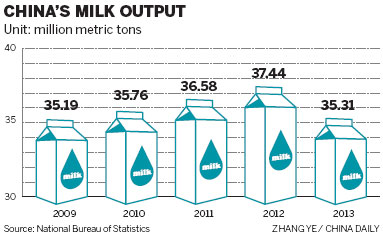
Corn silage specifically for feeding cows is grown in spring and summer and then stored for a month for a fermentation process. It is easily digested by cows and supplies valuable nutrients for cows' overall health.
Alfalfa mixed with grass hay can result in a better balance of forage for feeding cows.
But while US alfalfa hay was sold in China at $340 per ton last month, a similar Chinese crop with relatively lower quality was priced at $230 per ton, said the China National Grain and Oils Information Center.
Song Liang, a dairy industry analyst at the distribution productivity promotion center of China Commerce, a Beijing-based business think tank, said that because most farmland in China is used for growing grains and vegetables for human consumption, the cultivation of forage crops is far behind that of developed countries and relies heavily on imported alfalfa to supply domestic dairy farms.
"China needs 200 million metric tons of forage crops to meet the demand of its dairy sector each year and must further increase imports of alfalfa and corn silage to prevent an aggravated shortfall this year," he said.
The country imported 678,300 tons of alfalfa from global markets such as Canada and the US between January and November 2013, a surge of 66 percent over the same period a year earlier.
To meet the nation's diversified demand for dairy products such as yogurt, cream and milk, the Ministry of Agriculture issued new policies to support forage crop projects by offering financial and technical assistance. Hebei also plans to develop 16,600 hectares of alfalfa farmland and 26,000 hectares of corn silage planting land before 2017 to lessen the pressure on dairy farm owners.
